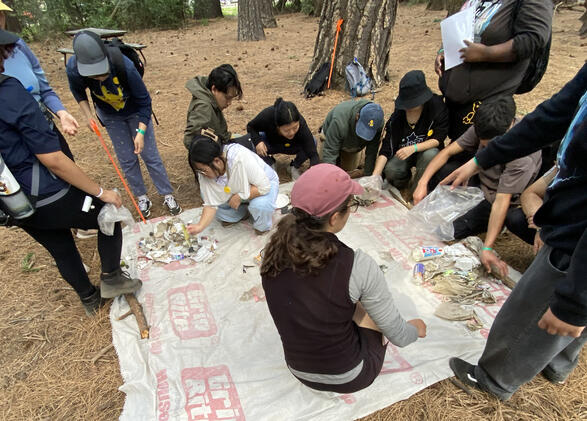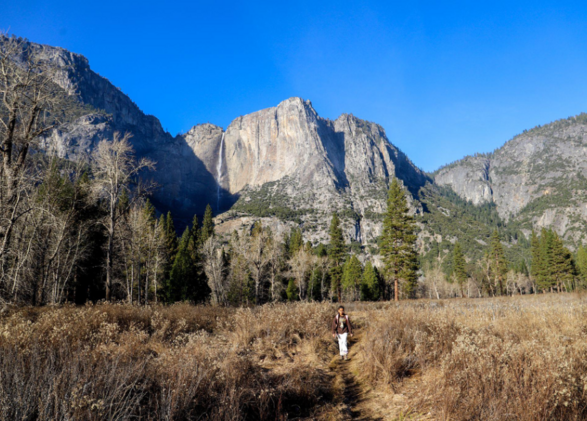Preparing For Your First Backpacking Trip

For all those up for the adventure, backpacking is an incredibly rewarding experience. Spending the day hiking through the beauty of our national lands and the night camping under the stars allows you to form deep connections with the natural world, as well as with your fellow hikers.
Perhaps you’ve gone on several day hikes or have pitched a tent at a designated campsite and now you’re ready to broaden your horizons. If you’re preparing for your first backpacking trip, it may seem daunting at first. The good news is that if you’re taking part in any of our NatureBridge summer backpacking trips, including our Alcoa Scholars and Armstrong Scholars summer programs, there’s no experience necessary! As long as you show up for your first backpacking trip with the right attitude and a willingness to take risks and learn, you’ll be good to go.
Put in the Time #
Though our NatureBridge programs don’t require prior backpacking experience, we do suggest that you prepare physically with regular exercise. Hikes on our summer backpacking programs can include up to 10 miles per day on uneven terrain, up and over mountain passes. Keep in mind that you’ll also be carrying a bag weighing 30-50 pounds.
To best prepare for your first backpacking trip, you will want to ensure that you have properly trained. On top of regular exercise, it can be beneficial to do some short day hiking in your area.
I was nervous about not being physically or mentally strong enough, but now I am a backpacking guru!11th grader India Grace Briggs, 2018 Olympic Summer Backpacking participant
Start Small #
When you are preparing physically, however, keep in mind that you don’t have to conquer the highest peaks and longest trails on your first go. Pushing yourself too hard, too fast may result in injuries or strain. Start small, with just a few miles at a time. You can slowly ramp up your mileage as your endurance increases.
When training, it’s important to practice hiking with a weighted backpack and the hiking shoes you plan to wear on the trip. This will help you feel physically ready for backpacking, as well as reduce the chance of blisters or injury on the trail.
The first time I ever backpacked, what really struck me was the genuine connections I made with the other people in my group—people I had never met before but whom I shared a love of the outdoors with. It was the unique way you connect to your peers when there aren’t the distractions of the “real world” that has kept me seeking new backpacking adventures.Katie Draude, NatureBridge Summer Programs Manager
Do Your Research #
Generally when heading out into the backcountry, you’ll need to do your research to determine what permits are needed. In some areas, permits need to be acquired in advance. At other parks, you can pick them up at the ranger station or trailhead on the day of your departure. Luckily, at NatureBridge we take care of all of the logistics and permitting ahead of time.
NatureBridge is a proud partner of the National Park Service and values the work the Park Service does to protect wilderness areas. In both national parks in which NatureBridge operates Summer Backpacking programs, Olympic and Yosemite, 95% of the entire parks are designated wilderness areas.
Doing your research also means keeping an eye on the weather. Temperatures and forecasts in the backcountry can change quickly so it’s always important to stay up to date. Preparing for your trip also means leaving a detailed plan of your whereabouts with a friend or family member. Again, at NatureBridge, we take care of all of these logistics for you!
Pack Smart #
Packing smart for your backpacking trip is crucial for two reasons. Most importantly, you want to ensure you are carrying everything you will need for your health and safety on your backpacking trip. This includes everything from the right clothing, layers and enough food and nutrition to the right supplies, navigation and first aid gear. Once you’re out on the trail, you won’t have the leisure of turning back to grab your compass or flashlight.
Secondly, you want to ensure that your pack is comfortable and light enough to carry. It’s likely that your backpack will weigh between 30 and 40 pounds. For more detailed direction, check out our ultimate backpacking list here.
Please note: If you’re planning your backpacking trip with NatureBridge, you will not be responsible for your own:
- First aid equipment
- Map and compass
- Stoves, fuel, group cooking equipment
- Tents
- Bear canisters
- Toilet paper, soap, hand sanitizer
- Water purification
- Permits or radios
- Meals and snacks
Unplug #
If you’re planning a multi-day backpacking trip, you may also take advantage of the time to disconnect. As cell service is unlikely, you won’t have much use for your cell phone anyway.
Use your backcountry adventure as a time to disconnect to reconnect. Stepping away from technology and into the wilderness is an opportunity to reconnect with nature, yourself and those around you. Turn off your screens—you’ll be happy you did.





